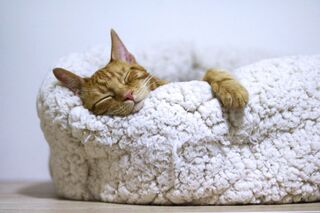Depression
My Stay-at-Home Coronavirus Experience
Would it bury me into another state of depression?
Posted October 8, 2020 Reviewed by Lybi Ma
When the Coved-19 fat-demic first started, one of my biggest concerns other than getting the virus was getting fat. Several years ago I gained 30 pounds on Lithium and became depressed, and really didn’t want to leave my home.
I worried about how I was going to adapt to a new lifestyle. When it came to my diet, for the most part, I decided I was going to eat tuna fish out of a can and down Gatorade all day.
Then another issue crossed my mind. As someone that has experienced bouts of depression over the years, part of me thought I might be ahead of the curve in terms of adapting to isolation. I know what it’s like to stay at home, but there is a difference between not wanting to leave your home due to chronic depression versus you are recommended not to leave your home. I found myself conflicted for I didn’t want this stay-at-home to bury me into another state of depression, and I started feeling anxious and became hard on myself as I tried to figure out the healthiest way to adjust accordingly.
On top of that self-inflicted pressure, the fact that I didn’t feel comfortable seeing my psychiatrist—unless it was absolutely necessary—was also a challenge for me. It’s not just fear of getting exposed to the virus, but my license had expired and the DMV was not taking any new appointments, so I was reluctant to drive my Vespa Scooter in case I got pulled over.
I could care less about my washed-out hair roots or the state of my neglected toes due to no pedicures but know from my depression episodes that when I don’t maintain my physical appearance it’s a scary sign of depression onset. When I slump around my home in sweats, unkempt hair, and flip-flops I get worried that it will make me more prone to slipping down. I don’t know the last time I’ve worn a dress or heels, yet this is the new normal. I know I am not alone in this, I see people from TV producing their shows from home, and they look kinda sloppy. How many beards have you seen on men that were always clean-shaven?
Then there is the ex-factor. Yes, I reconnected with my ex-boyfriend and invited him to come over and practice yoga with me. I thought it could help me be accountable for working out and honestly wanted a friend, only to discover his only intention was to try and sleep with me. I didn’t, thank God, and when he left I felt disappointment for having feelings of being needy for companionship. I also felt like I stepped backwards given all the months I had spent in therapy learning how to create boundaries and work on myself.
Mid-way through my desperate attempt to implement structure, the second phase took hold. Phase two was about three months into the stay-at-home experience. I stopped eating out of a can and started getting fat. I stopped practicing yoga at home. I stopped trying to keep in touch with my loved ones, and I struggled with digging myself out of it.

I am a 43-year-old woman living in Downtown Los Angeles. I am single with no kids but have a 16-year-old cat, so I am grateful for that, but as the seasons change I realize I have to figure out how to make phase three a positive turn.
What is phase three? Phase three is the upcoming months that will continue to be the same shelter-at-home with uncertainty with how I will respond. I’ll have to try extra hard to workout, and try and eat right, but I don’t know how my mental health will be affected. I have Bipolar II, I know my tendencies, and have decided it’s time to prepare.
Rule #1: Stop eating comfort junk food off of food trucks and get back on the yoga mat.
Rule #2: Stop engaging with your ex-boyfriend and reach out to your loved ones.
Rule #3: Stop being so hard on yourself.
Rule #3 is the most crucial rule of all and quite frankly the most challenging. Many people are out there on social media talking about taking up a new hobby, or learning a new language, with pictures of productivity and accomplishments. Sorry, haven’t done any of that, nor do I care to. People post their at-home exercise videos like it’s an alternative to working out at the gym, but it’s not. People non-intentionally apply pressure when they say, “I want to look back at this solitary time and say I achieved something.”
Guess what? It’s okay not to learn how to do a cartwheel. It’s okay that you didn’t clean out your closet and donate your shirts from the ’80s. It’s okay that you are struggling and things are uncertain. It’s okay to cry for no reason.
What’s not okay is being hard on yourself.
Moving forward, my ultimate goal is to be kind to myself. When I look back at this time, what truly counts is that I loved myself, despite my circumstances and personal challenges. I did my best to stop that negative voice in my brain. I’m not going to compare myself to other people. I am going to be grateful that I have my health, and although things aren’t optimal, I did my best to try and adjust.
Although I was initially disappointed in myself and caught myself beating myself up, I turned it around and told myself okay, not again. I may be enduring this stay-at-home experience alone, but I will make it through, and being kind to myself will be my ultimate achievement.
If you find yourself being unnecessarily hard on yourself during these unprecedented times, stop it. Give yourself a break. It’s okay to be out of sorts, but try not to judge yourself or compare yourself to other people. We’re all struggling in our own ways, and all of us are experiencing this time uniquely.
Bottom line: Be kind to yourself.




